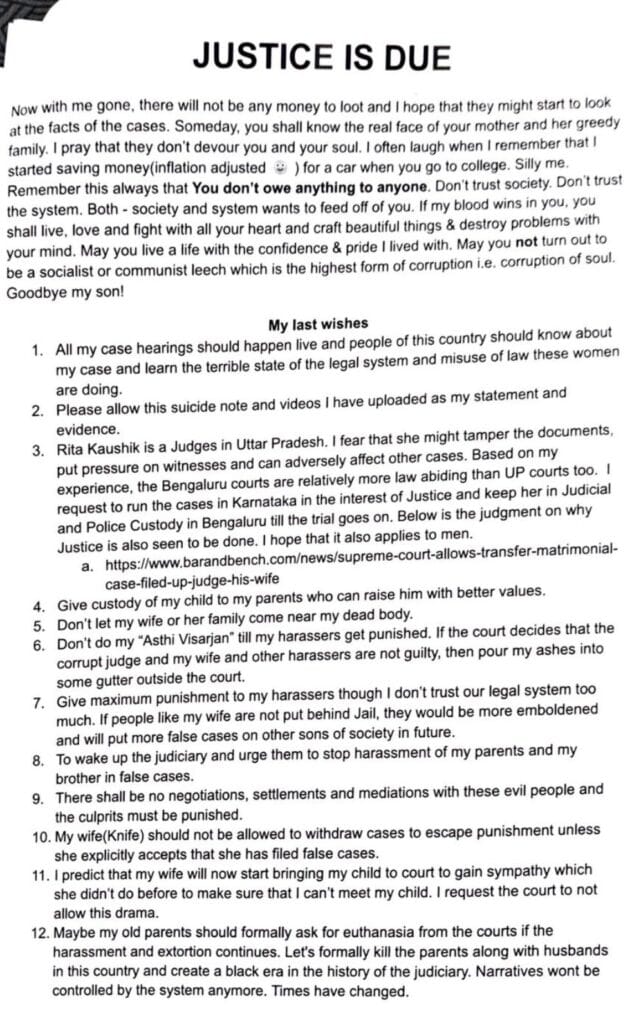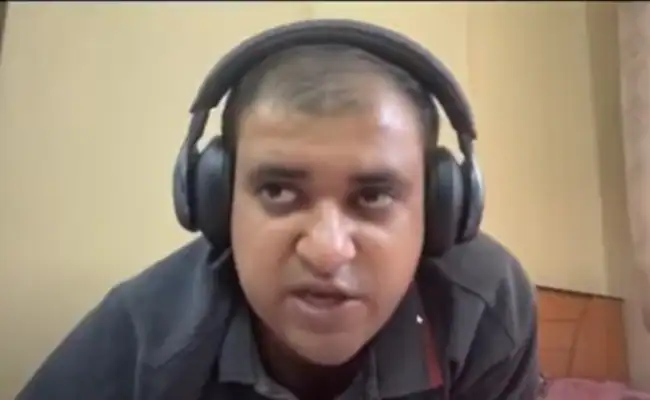The recent suicide of a 34-year-old Bengaluru techie, Atul Subhash, has brought to light the grim realities faced by men embroiled in contentious domestic disputes and legal battles. His tragic end, underscored by a heart-wrenching 24-page suicide note and a video, calls for an urgent discussion on the need for legal protections for men in similar circumstances.
Who is Atul Subhash Blaming in His Suicide Note?
Atul Subhash, originally from Uttar Pradesh, was a deputy general manager in a private firm. He lived in Bengaluru after separating from his wife, Nikita Singhania. The couple married in 2019 and had a four-year-old son. Following their separation, Atul faced multiple legal cases filed by his wife, including accusations of domestic violence, harassment, and dowry demands.
Atul’s 24-page suicide note names:
- His Wife, Nikita Singhania: Atul accused her of filing multiple false cases, including domestic violence, harassment, dowry demands, and other severe allegations that caused him mental and emotional distress.
- Her Family: He implicated Nikita’s mother, brother, and uncle in the harassment and alleged extortion attempts, claiming they demanded ₹3 crore for case settlement.
- A Family Court Judge in Uttar Pradesh: Atul alleged the judge ignored his side of the story and facilitated corrupt practices, exacerbating his suffering
Blame on the Judiciary
Atul’s suicide note named a judge for allegedly ignoring evidence in his favor and for possible collusion in corrupt practices. This has sparked calls for transparency and accountability in family court systems, emphasizing the psychological toll of prolonged and biased legal battles
Atul accused a family court judge in Jaunpur, Uttar Pradesh, of bias and corruption. He claimed that:
- The judge disregarded evidence supporting his case.
- Bribes were allegedly paid to an officer in the court, who acted in front of the judge without reprimand. This contributed to Atul’s perception that he could not expect fair treatment from the judicial system
The Suicide Note and Video
Atul’s note and video were shared with an NGO WhatsApp group dedicated to addressing domestic abuse issues. Key revelations from his note include:
- Accusations against his wife and her family for false allegations and harassment.
- Criticism of a family court judge in Jaunpur, Uttar Pradesh, for alleged corruption and unfair rulings.
- A plea for justice and accountability for all involved in his suffering
Among his final wishes, Atul penned a poignant letter to his son, urging him to grow up understanding the truth behind his father’s decision. He also made 12 specific requests, including fair investigation procedures and systemic reforms to ensure justice for victims of false accusations.
12 Last Wishes of a Bengaluru Techie in His Suicide Note
Based on the sources, here are the 12 wishes that Atul Subhash expressed in his suicide note:
Donation of His Body: If justice was served in his case, he requested that his body be offered to the Ganges; otherwise, it should be discarded near a courthouse to symbolize the perceived injustice.
Protection for His Son: He asked that his son be safeguarded from his estranged wife and her family, whom he accused of exploitation and harassment.
Return of Gifts: He wanted all the gifts he had given to his wife during their marriage to be returned to him or his family.
Transparent Legal Investigation: He urged for an impartial inquiry into the harassment and corruption he alleged in his case.
Action Against False Cases: Atul demanded that stringent actions be taken against those who file false accusations and exploit the legal system.
Support for Men in Distress: He requested greater societal and legal support for men suffering from similar harassment, calling for reforms in laws that he believed were one-sided.
Education About Marital Laws: He proposed creating awareness about marital laws to ensure individuals understand their rights and responsibilities.
Investigation of Judicial Corruption: He accused a judge of corruption and sought an investigation into the matter.
Care for His Parents: Atul expressed his wish that his parents be taken care of and supported in his absence.
Return of Financial Losses: He demanded the return of the money he alleged was extorted by his wife and her family.
Public Awareness Campaign: He emphasized the need for campaigns to highlight the challenges faced by men in legal disputes stemming from marital conflicts.
Dedication to Truth: Atul sought that his case be used as an example to advocate for truth, fairness, and reform in the legal system to prevent similar tragedies.
These wishes reflect Atul’s emotional and mental state as he grappled with the legal and personal challenges he faced. His case has reignited discussions about the need for reforms to address issues of fairness in laws related to domestic and marital disputes

Broader Implications: The Plight of Men in False Cases
Atul’s case is not isolated. According to NCRB statistics, nearly 30% of male suicides in India in recent years were attributed to family and domestic issues. Many men face societal stigma, lack of support systems, and overwhelming legal hurdles. Legal provisions under Section 498A of the IPC, while intended to protect women, have occasionally been misused, resulting in undue harassment of men
Call for Legal Reform
The tragedy underlines the urgent need to reassess existing laws to ensure they protect both genders equally. Advocacy groups are calling for:
- Gender-neutral laws in domestic disputes.
- Support systems for men, including legal aid and mental health resources.
- Clear mechanisms to prevent misuse of laws like Section 498A.
- Greater judicial accountability in family courts.
Conclusion
Atul Subhash’s heartbreaking story is a grim reminder of the need for empathy, fairness, and reform. While laws protecting vulnerable parties are essential, unchecked misuse can destroy lives. It is imperative to create a balanced legal framework that offers justice for all.




